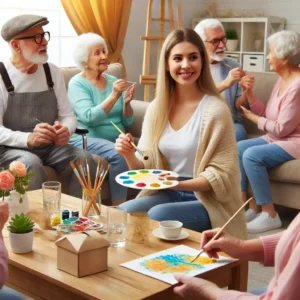How To Foster Meaningful Relationships In Later Life: A Guide to Connection and Fulfillment
Building and maintaining meaningful relationships in later life is one of the most rewarding investments you can make. Strong social connections enhance emotional well-being, promote longevity, and improve overall life satisfaction. Studies have shown that seniors with active social lives are healthier, happier, and live longer than those who experience isolation.
However, many older adults face barriers to connection, whether due to physical limitations, technological hurdles, or changing social dynamics. The good news? It’s never too late to create new friendships, deepen existing bonds, and foster relationships that bring joy and fulfillment.
In this guide, we’ll explore practical ways to build and sustain meaningful relationships, overcome common challenges, and make socializing an enriching part of your life.
The Importance of Meaningful Relationships in Later Life
🔹 How Relationships Impact Longevity and Well-Being
Social bonds don’t just make life more enjoyable—they can actually add years to your life. Research has shown that individuals with strong relationships are 50% more likely to live longer than those who are socially isolated. Why? Because human connection:
✔ Reduces stress and anxiety
✔ Boosts cognitive function and reduces the risk of dementia
✔ Strengthens the immune system
✔ Enhances self-worth and sense of belonging
Having people to share experiences with, talk to, and rely on creates a positive cycle that improves both mental and physical health.
🔹 Overcoming Loneliness and Isolation
Many seniors experience social isolation, which can lead to:
❌ Increased risk of depression and anxiety
❌ Declining physical health
❌ Cognitive decline
Ways to combat loneliness:
✅ Engage in community activities (clubs, senior centers, volunteer work)
✅ Reach out to family and friends regularly
✅ Explore online communication tools (Zoom, WhatsApp, Facebook)
✅ Consider group hobbies such as book clubs, fitness classes, or gardening groups

Example: Margaret, a 72-year-old widow, struggled with loneliness after retirement. She joined a local walking group and a book club, where she made new friends who shared her interests. Within a few months, she felt more connected and engaged in life.
Overcoming Barriers to Connection
🔹 Physical and Technological Barriers
Aging can sometimes make it difficult to get out and socialize, especially if mobility is an issue. Similarly, many older adults struggle with technology, making digital communication seem intimidating.
✅ Solutions for Physical Barriers:
✔ Look for accessible community spaces with senior-friendly facilities
✔ Participate in virtual social events to stay connected from home
✔ Use rideshare services (Uber, Lyft) or public transport to attend events
✅ Solutions for Technological Barriers:
✔ Take a basic tech class at a library or community center
✔ Ask a family member to teach you how to use social media or video calls
✔ Start with user-friendly apps like WhatsApp, Skype, or Facebook
Example: David, 68, initially felt overwhelmed by technology. His granddaughter helped him set up a Facebook account, where he reconnected with old friends and now enjoys video chatting with his grandchildren every week.

Building a Supportive Social Network
🔹 Finding New Avenues for Socialization
Social connections don’t just appear overnight—you have to actively seek opportunities to meet new people.
✅ Ways to Expand Your Social Network:
✔ Join hobby-based groups (gardening, art, chess, etc.)
✔ Attend local events such as concerts, lectures, or senior meetups
✔ Volunteer for a cause you care about
✔ Try fitness classes like yoga, swimming, or group walks
💡 Tip: Senior centers, libraries, and community centers often have social programs specifically designed for older adults.
Example: Roger, 70, rekindled his love for music by joining a local choir. He formed friendships with other members, making socializing an enjoyable part of his weekly routine.

🔹 Embracing Intergenerational Relationships
Connecting with younger generations can bring a refreshing perspective and create mutual learning opportunities.
✅ Ways to Build Intergenerational Friendships:
✔ Mentor a younger person in your area of expertise
✔ Engage in family activities with grandchildren or younger relatives
✔ Join intergenerational programs at community centers or churches
✔ Volunteer at schools or youth programs
Example: Susan, 65, started tutoring high school students in English. She built strong connections with young learners, while they helped her learn about new technology and pop culture.
Nurturing Existing Relationships
🔹 Strengthening Family Bonds
Family connections are vital in later life, but they require effort to maintain.
✅ Ways to Strengthen Family Relationships:
✔ Schedule regular calls or visits
✔ Participate in family traditions and celebrations
✔ Show interest in younger family members’ lives
✔ Use social media to stay updated on family activities
Example: Linda and her son live in different states. To stay close, they have a weekly video call and share daily updates through a family group chat.
🔹 Rekindling Old Friendships
Sometimes, the best relationships are the ones we’ve let fade over time.
✅ How to Reconnect with Old Friends:
✔ Reach out via social media or phone calls
✔ Plan a catch-up coffee or lunch
✔ Send a simple message—sometimes, all it takes is, “I was thinking about you!”
Example: George, 74, reached out to his childhood friend on Facebook. They rekindled their friendship and now meet for coffee every month.
🔹 Communication Skills for Stronger Connections
Good relationships thrive on effective communication.
✅ How to Improve Communication:
✔ Practice active listening (pay full attention and ask follow-up questions)
✔ Be open and honest about your feelings
✔ Use positive language and avoid criticism
✔ Be empathetic and understanding
💡 Tip: Avoid relying solely on texting—sometimes, a phone call or face-to-face meeting is much more meaningful.
Final Thoughts: The Joy of Meaningful Connections
Fostering meaningful relationships in later life is one of the most fulfilling ways to enhance well-being and happiness. By making an effort to overcome barriers, build a supportive social network, and nurture existing relationships, you can create a vibrant social life filled with connection and purpose.
💡 Action Steps:
✔ Join a new social group or activity that interests you.
✔ Reach out to an old friend or family member this week.
✔ Try a new technology tool to stay connected.
✔ Embrace intergenerational friendships for fresh perspectives.
💬 Which of these tips resonates with you the most? Share your thoughts and experiences in the comments! 🌟.

My name is Larry, and I’d like to thank you for visiting Senior Citizens Fitness. I’m so passionate about staying fit in my later years. I hope you found some useful information here. Thanks again, and please subscribe and leave comments.
If You are a Senior like me and passionate about something and want to blog about it and possibly earn a decent income. Check this out.


